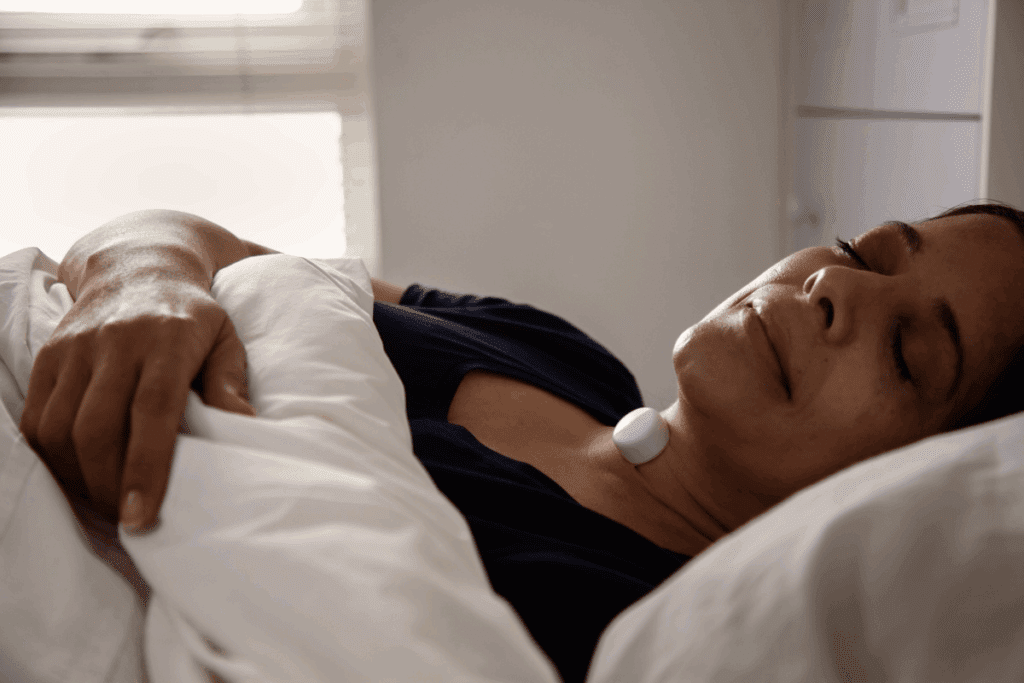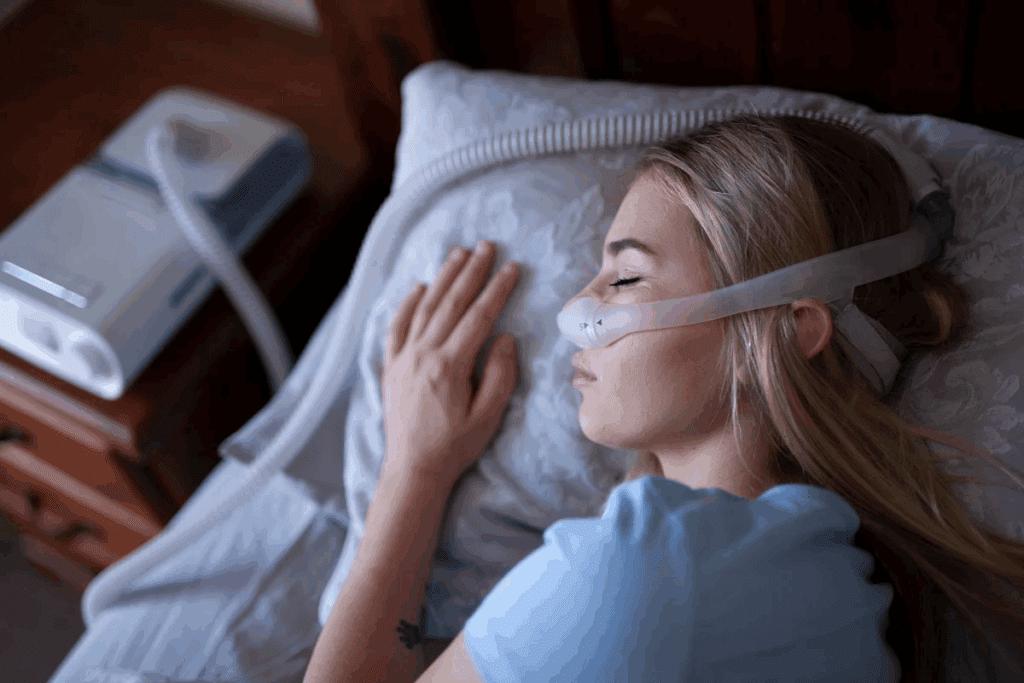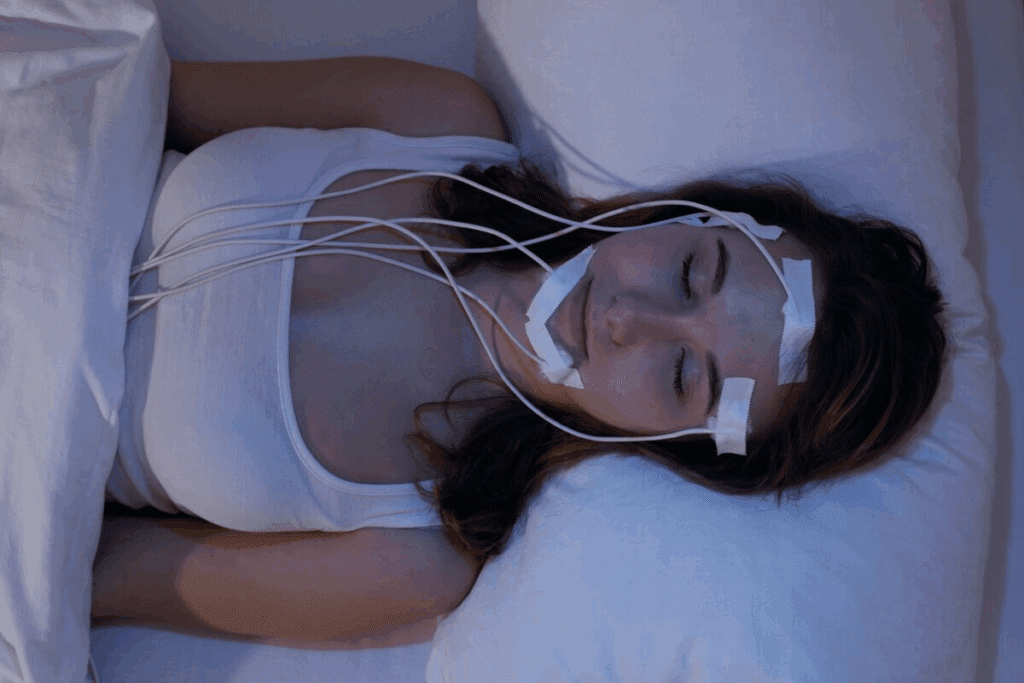Last Updated on October 21, 2025 by mcelik

Millions of Americans struggle with sleep disorders. These issues greatly affect daily life and health. A Complete Blood Count (CBC) test can spot health problems that might cause these disorders.
A CBC test checks different blood parts. It looks at red and white blood cells, hemoglobin, and hematocrit. If these are off, it could mean health issues that mess with sleep.
Knowing how a CBC helps find sleep disorders can reveal what’s causing sleep problems. This could lead to better treatments. The powerful new use: Can a CBC test for sleep disorders help you finally get amazing rest? Learn how this tool works.
A CBC test, or complete blood count, is a key tool for doctors. It checks different parts of your blood. This includes red blood cells, white blood cells, and platelets.
A CBC test looks at several important parts of your blood. These are:
A CBC test is done by taking blood from a vein in your arm. Here’s how:
The results come back in a few hours or days, depending on the lab.
CBC results are compared to normal values to find any issues. These values can change slightly between labs. But they usually include:
Knowing these values is key to understanding CBC results. This is true when looking at sleep disorders or other health problems.
The connection between blood health and sleep quality is complex. It involves many physiological processes. Blood health is key to normal sleep patterns. Problems in blood composition can cause sleep disorders.
Blood composition impacts sleep cycles in several ways. Nutrients and hormones in the blood help control sleep-wake cycles. Adequate iron levels are vital for sleep, as iron deficiency can cause restless leg syndrome and insomnia.
“The link between iron deficiency and sleep problems is clear,” studies show. Getting enough iron through diet or supplements can help with sleep issues.
The connection between blood and sleep is complex. Blood carries oxygen and nutrients to the brain, which controls sleep. Abnormalities in blood cell counts, like anemia or polycythemia, can mess with sleep patterns.
A CBC test can show blood problems that might cause sleep issues. Healthcare providers can find the cause of sleep troubles by looking at blood composition.
Many blood problems can mess with sleep, including anemia, inflammation, and thyroid issues. Anemia can make you tired, weak, and short of breath. It’s hard to fall asleep or stay asleep.
Understanding the link between blood health and sleep quality helps people address issues. This can improve their sleep.

A CBC test is useful for checking overall health but has its limits in diagnosing sleep disorders. It looks at different parts of the blood. But, it’s not the best for directly finding sleep disorders.
The CBC test isn’t made for diagnosing sleep disorders. It checks blood components like red and white blood cells. It can show health issues that might affect sleep, but it can’t pinpoint sleep disorders like insomnia or sleep apnea.
Key limitations include:
Even with its limits, a CBC test is often part of a full check-up for sleep disorders. Doctors might use it to find out if other health issues are causing sleep problems, like anemia or infections.
“A CBC test can provide valuable information about a patient’s overall health and help identify possible causes of sleep disturbances.”
To really figure out sleep disorders, doctors use many tests and checks. These include:
In short, a CBC test can’t directly say if you have a sleep disorder. But, it’s a key part of figuring out what’s going on. It helps doctors find health issues that might be messing with your sleep.

A CBC test is useful for finding health issues that affect sleep. It looks at different parts of the blood. This helps doctors understand sleep disorders better.
Many health problems can mess with sleep. A CBC test can spot these issues. This includes:
CBC tests show signs of sleep problems. These signs include:
Understanding CBC results for sleep issues needs a deep look. Doctors use CBC results with medical history and symptoms to find sleep problems’ causes.
Knowing what a CBC test shows about sleep disorders helps people see its value. It’s key for tackling sleep-related health problems.
A Complete Blood Count (CBC) test is key in linking anemia to sleep issues. Anemia, marked by low red blood cells or hemoglobin, harms sleep quality.
Low hemoglobin in anemia means less oxygen to the brain and body. This can mess up sleep, causing insomnia or other sleep problems. Research shows anemia can lead to sleep issues, making diagnosis and treatment critical.
Iron deficiency anemia affects sleep badly. Studies link iron deficiency to restless leg syndrome, which disrupts sleep. A CBC test can spot iron deficiency anemia, helping find sleep problem causes.
A CBC test checks for anemia through hemoglobin, red blood cell count, and MCV. These signs help find anemia types and guide treatments to better sleep.
Treating anemia-induced sleep problems starts with fixing the anemia cause. Iron supplements often help iron deficiency anemia and its sleep effects. Diet changes and other treatments may also be suggested based on CBC results and patient needs.
Inflammation, shown by CBC tests, greatly affects sleep. When the body has inflammation, it can lead to poor sleep quality. This is because inflammation triggers many body responses that harm sleep.
White blood cells are key in CBC tests, showing inflammation. High counts might mean an inflammatory issue is affecting sleep. For example, infections or autoimmune diseases can raise white blood cell counts, messing with sleep.
Understanding the link between white blood cell counts and sleep disruption is key for treating sleep issues. Doctors use CBC results to find inflammatory causes of sleep problems.
Chronic inflammation lasts long and harms health, including sleep. Research links chronic inflammation to sleep disorders like insomnia and sleep apnea. CBC tests help doctors see how much inflammation is affecting sleep.
Addressing chronic inflammation is vital for better sleep. This might mean treating underlying conditions, changing lifestyle, or using anti-inflammatory treatments.
Many inflammatory conditions harm sleep quality. These include rheumatoid arthritis, lupus, and other autoimmune diseases. CBC tests spot inflammation markers in these conditions, helping diagnose and manage sleep issues.
Understanding the connection between inflammation markers and sleep issues helps doctors create better treatment plans. This improves sleep disorders and overall health.
Sleep patterns are closely tied to thyroid function. Problems with thyroid hormones can disrupt sleep cycles. The thyroid gland makes hormones that control metabolism and energy. When thyroid function is off, it can cause sleep issues.
Thyroid problems can show up in blood tests, but a CBC isn’t a direct test. Thyroid-stimulating hormone (TSH) levels are key to checking thyroid health. If TSH levels are off, it might mean hypothyroidism or hyperthyroidism. A CBC can hint at thyroid issues by looking at related blood components.
Anemia can be linked to hypothyroidism, and a CBC might show low hemoglobin or hematocrit. Hyperthyroidism can cause more red blood cells. So, while a CBC isn’t a thyroid test, it can suggest further testing is needed.
Thyroid hormone imbalances can really mess with sleep. Hyperthyroidism can cause insomnia and trouble falling asleep. Hypothyroidism can make you tired and lead to sleep apnea.
It’s important to understand these links to diagnose and treat sleep problems tied to thyroid issues.
While a CBC can hint at thyroid issues, thyroid function tests are needed for a diagnosis. These tests check TSH, FT4, and FT3 levels in the blood.
| Test | Description |
| TSH | Primary indicator of thyroid health; abnormal levels signal hypothyroidism or hyperthyroidism |
| FT4 | Measures the level of free thyroxine in the blood; helps diagnose thyroid disorders |
| FT3 | Measures the level of free triiodothyronine; important for assessing thyroid hormone production |
More tests, like thyroid antibody tests, might be needed. A full thyroid check is key for those with sleep problems possibly linked to thyroid issues.
Vitamin deficiencies can really hurt your sleep quality. CBC tests can spot these issues. Knowing how nutrients affect sleep can help fix sleep problems.
A CBC test can show if you lack Vitamin B12. Mean Corpuscular Volume (MCV) is a key marker. If MCV is high, it might mean you’re low on B12. Also, a CBC can show anemia, which often comes with B12 deficiency.
A study in a Journal says, “Vitamin B12 deficiency often causes megaloblastic anemia, with high MCV.”
“Doctors use CBC and vitamin B12 tests to diagnose B12 deficiency.”
| CBC Marker | Normal Range | Indication of B12 Deficiency |
| MCV | 80-100 fL | Elevated MCV (>100 fL) |
| Hemoglobin (Hb) | 13.5-17.5 g/dL (male) | Low Hb ( |
| Hematocrit (Hct) | 40-54% (male) | Low Hct ( |
CBC tests don’t directly check Vitamin D levels. But, they can show if you’re missing other nutrients, like Vitamin D. Studies link Vitamin D deficiency to sleep problems like insomnia and sleep apnea.
A study in the Journal of Clinical Sleep Medicine
Other nutrients, like iron, can also mess with sleep. Iron deficiency can cause restless leg syndrome, which really disrupts sleep.
If a CBC test shows a nutrient gap, supplements can help. For B12 deficiency, taking B12 orally or by injection can help. For Vitamin D, Vitamin D3 supplements are often suggested.
Fixing nutrient gaps can improve sleep and overall health.
A CBC test can show signs that might point to sleep apnea. Sleep apnea is a serious condition where breathing stops during sleep. Knowing how CBC results relate to sleep apnea helps find people who need more sleep studies.
Studies have found blood markers linked to sleep apnea. These include signs of inflammation and other markers. For example, people with sleep apnea often have higher inflammatory markers in their blood.
Key Blood Markers:
These signs can show inflammation or other issues linked to sleep apnea.
Sleep apnea can change blood composition due to breathing stops. These changes can cause inflammation and oxidative stress, seen in CBC results. For instance, low oxygen levels in sleep apnea can lead to more red blood cells, found in a CBC test.
A sleep specialist says, “The link between sleep apnea and blood changes is an area of growing research. It offers new ways to diagnose and treat.”
“Sleep apnea is not just a sleep disorder; it’s a systemic condition that can affect multiple aspects of health, including blood composition.”
If CBC results show signs of sleep apnea, like high hematocrit or inflammation, doctors might suggest sleep studies. These studies, like polysomnography (PSG), can diagnose and measure sleep apnea’s severity.
| CBC Parameter | Potential Indication |
| Elevated White Blood Cell Count | Inflammation, possible sleep apnea |
| Increased Hematocrit | Intermittent hypoxia, possible sleep apnea |
In conclusion, a CBC test isn’t a direct test for sleep apnea. But, it can give clues that, with other signs, might lead to more sleep disorder tests.
Restless Leg Syndrome (RLS) and Periodic Limb Movement Disorder (PLMD) affect sleep quality. CBC results can help understand their causes. These conditions cause uncomfortable leg sensations and involuntary movements, disrupting sleep.
Iron deficiency is linked to Restless Leg Syndrome. A CBC test can spot iron deficiency anemia, common in RLS. Low iron affects dopamine, key for movement control.
Studies show iron supplements help RLS symptoms in those with low iron.
Other blood markers offer clues about Restless Leg Syndrome and Periodic Limb Movement Disorder. CBC results can show white blood cell count issues. This might point to inflammation, which could cause these disorders.
CBC results are useful but not the only tool. They’re used with other tests to diagnose RLS, PLMD, and similar symptoms. A full diagnosis might include sleep studies, neurological checks, and more blood tests.
Chronic fatigue syndrome is a complex condition that needs a detailed diagnosis. CBC tests are part of this process. It’s hard to diagnose CFS because its symptoms are similar to those of sleep disorders.
CBC tests play a key role in telling CFS apart from sleep disorders. Both can cause fatigue, but their causes and blood signs are different.
There’s no single test for CFS, but CBC results can hint at it. For example, unusual white blood cell counts or mild inflammation might show up.
Key blood markers to consider:
CBC tests help rule out other fatigue causes like anemia, infections, or leukemia. By looking at CBC results, doctors can find the likely cause of symptoms.
For instance, if a patient is tired and the CBC shows low hemoglobin, it’s probably anemia. But if the CBC is normal and the patient is very tired, it might mean CFS or another disorder.
If you’re having trouble sleeping, knowing when to get a CBC test can help find the cause. Sleep problems can be tricky, and a CBC test can show important health info linked to sleep.
Some symptoms suggest you might need a CBC test for sleep issues. These include:
If you’re experiencing any of these symptoms, it’s essential to discuss them with your healthcare provider.
Your healthcare provider is key in deciding if a CBC test is right for you. Be ready to talk about your sleep, medical history, and any symptoms. This info helps your provider decide if a CBC test is needed.
A CBC test might be part of a bigger plan to check sleep disorders. Other tests that could be used with CBC include:
These tests help understand your sleep health better.
If your CBC test shows abnormal results, more tests might be needed. This could be more blood tests, imaging, or other tests. Your healthcare provider will tell you what to do next based on your results.
A Complete Blood Count (CBC) test is key in checking sleep health. It finds issues that might cause sleep problems. It looks at blood health, which affects how well we sleep.
The CBC test can spot problems like anemia and inflammation. These can mess with our sleep. Doctors use CBC results to understand sleep issues better.
Even though a CBC test isn’t a direct sleep disorder test, it’s very helpful. It’s part of a bigger check-up for sleep. Doctors use it along with other tests and medical history to understand sleep health fully.
In short, a CBC test helps with sleep issues by looking at blood health. Knowing how CBC helps in sleep health diagnosis helps people deal with sleep problems. They can work with doctors to find good treatments.
A CBC test can show if other health issues are causing sleep problems. But, it can’t directly say you have a sleep disorder.
A CBC test can find issues like anemia or vitamin shortages. These might be why you’re not sleeping well.
A CBC test looks at blood cells and their levels. If these are off, it might mean you have a health issue that’s keeping you awake.
A CBC test can’t directly spot sleep apnea. But, it can show blood changes that might hint at it.
Anemia can make you tired and disrupt sleep. A CBC test can find anemia by checking your blood’s hemoglobin and hematocrit.
Yes, a CBC test can find signs of inflammation. This can mean you’re not sleeping well.
Iron deficiency anemia can mess with your sleep. A CBC test can spot it by looking at your blood’s hemoglobin and hematocrit.
Yes, a CBC test can show if you’re low on vitamins like B12. This can hurt your sleep quality.
If you’re always tired or having trouble sleeping, ask for a CBC test. It might find a blood issue causing your problems.
Other tests like thyroid or vitamin tests might be used with a CBC. They help figure out what’s wrong with your sleep.
A CBC test can check your iron levels. This is important for restless leg syndrome. It might be part of diagnosing these conditions.
A CBC test can rule out other health issues that might cause fatigue. It can also show blood markers for chronic fatigue syndrome.
References
Subscribe to our e-newsletter to stay informed about the latest innovations in the world of health and exclusive offers!